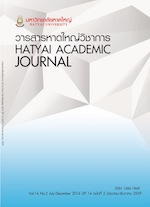คุณภาพและมาตรฐานการศึกษาของโรงเรียนเทศบาล: กรณีศึกษาเทศบาลนคร สงขลา และเทศบาลนครหาดใหญ่
Main Article Content
Abstract
Educational Quality and Standards of Municipal Schools: A Case Study of Songkhla and Hatyai Cities
The purpose of this research was to determine factors affecting the educational quality and standards of municipal schools. Under the supervision of Hatyai Municipality, three primary schools were selected as research case studies, while another three primary schools were under the municipality of Songkhla. All the schools, having different educational quality and standards with reference to the first five indicators of ONESQA criteria, were critically analyzed in order for the researcher to identify the factors. The data collected by the use of a multi-case comparative study of the schools’ SAR, O-Net scores, ONESQA’s External Evaluation of Educational Quality and Standards Reports, Annual Reports, interviews (structured and unstructured), and non-participant observation, were later qualitatively analyzed using the interpretive understanding method. The Triangulation Method employed in the study was to test the data’s reliability. Not only the schools’ management and their internal contexts such as teachers, students, and the students’ families and communities were the main factors affecting the educational quality and standards of the schools, as found by the study, but the factors’ functions and interactions among them.
Article Details
All submitted articles are subject to academic validation by qualified experts (peer review). The opinions expressed in each article of this publication are those of the authors themselves. The editorial board holds no responsibilities on them and does not reserve the copyright for academic use with the condition that the reference of their origin is cited.
